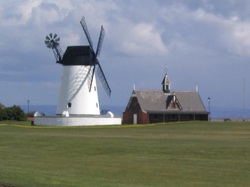
commemorate the town’s 130 Territorial soldiers who
marched to war on 6 August 1914 – within two days
of war being declared.
The soldiers, members of E Company, the Lytham
Territorials, 4th Battallion Loyal North Lancashire
Regiment, were at summer camp in Kirby Lonsdale when war was
declared on 4 August and, accordingly, were one of the first
companies in Britain to set off to war.
The men, mostly from Lytham, hastily returned to Lytham from where they marched to Preston rail station and then to an army camp in Swindon. From there they left for Flanders where they took part in the Battle of Festubert in the summer of 1915.
The blue plaque, provided by Lytham St Annes Civic Society, will be unveiled between 9.15am and 9.30am (approximate) on Wednesday 6 August by Councillor Kevin Eastham, Fylde’s mayor. It is being placed by Civic Society members on the wall of the Homestead complex of retirement flats on Henry Street – the former site of the company’s drill hall. Also present will be an army representative; a military padre; Civic Society members; Councillor Ed Nash, Fylde Council Armed Forces member and Community Covenant Leader; members of the public. Representatives of the media are invited.
Project spokesman James Hatfield, a former sergeant with the Queen’s Lancashire Regiment (now the Duke of
Lancaster’s Regiment), said: “The ceremony will be 100 years to the day since these soldiers marched off to
war, led by Captain Harry Nickson who later died in the fighting.
“It was a rainy day but there was a large cheering crowd to see them off. They were some of the first in Britain
to depart for war and not all of them made it back.
“Their first action was at Festubert where they had mixed results and suffered casualties: they initially advanced successfully but then made a tactical withdrawal.
“All the Territorials were ordinary citizens doing normal jobs in places like shops, offices and factories. They did an extraordinary thing in facing the hardened fighters of the Bavarian and Prussian regiments and all the people of the area should be proud of their efforts.”
Also invited to the unveiling is the Mayor of Horwich – the Lytham men’s E company was joined with
Horwich’s F company to form a new C company before sailing for France.
Research on the history of the Lytham soldiers has been carried out by James and also by Andrew Norris who has written a book, “Lytham’s Saturday Night Soldiers”, which will be published on Wednesday 6 August.
Councillor Ed Nash added: “This is an important part of the history of Fylde and I’m glad the Civic Society,
James and others have researched it. These departures for the front were soon seen in many towns, but I suspect that Lytham’s was one of the first. “I hope that many people will come along to see the unveiling of such an important plaque.”
One of the departing soldiers never, in fact, made it to France. Having arrived at the Swindon army camp, all
soldiers were vaccinated – and one died as a result on 2 November 1914. He is buried at St John the Divine Church in Lytham and the War Graves Commission has recently agreed to replace his headstone.
Once the unveiling is complete, LSA Civic Society will open a one-day exhibition of the company’s departure and subsequent activities in Lytham’s Assembly Rooms. A pamphlet about the Lytham soldiers will be available at the unveiling and the exhibition as will Mr Norris’s new book.
 RSS Feed
RSS Feed
